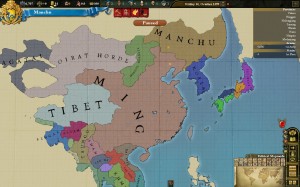This is part 2 of an irregular series on Europa Universalis III.
Part 1: The Byzantine Empire and puzzle-like gameplay.
Part 2: The Manchus, hordes, and the consequences of deficit spending.
I recently picked up Divine Wind, the Asian-focused expansion for Europa Universalis III, and I’ve had a lot of fun playing the Manchus, the people who would eventually conquer China and constitute its last imperial dynasty. The screenshot above shows the Manchu starting position in 1399 AD. To the south is the game’s sleeping giant, Ming China, and Korea. To the east, Japan. To the north, unclaimed wilderness. And to the west, the nomadic hordes of the steppe.
This last point needs a bit of explanation. Divine Wind introduced a new type of nation to the game: the “horde”. Whereas sedentary nations are at peace with each other by default, they are automatically at war with hordes, broken only by temporary truces. Those truces must be bought with either prestige (via an admission of defeat) or tribute, from one side to the other. And rather than exchanging land as part of a peace treaty, possession is ten-tenths of the law – to claim land from the horde, first you have to occupy it with soldiers, then send in colonists who will eventually bring the province under your control. The hordes on the Manchu border are small and weak, but as we’ll see, even a small enemy can be dangerous in unexpected ways…
When starting a game of EU3, it’s usually necessary to cut military funding to the bone during peacetime, and so I did that. This worked out just fine, as for the first few decades I played like an East Asian Netherlands or Switzerland – colonising unclaimed patches of land such as Taiwan and bits of Siberia, sending out merchants to Nanjing and Malacca, and building up my infrastructure. What I didn’t realise was during that time, my game was affected by a glitch that prevented my armies from moving – and I strongly suspect this also prevented computer-controlled armies from moving, thus effectively enforcing world peace. In other words, things should not have been so easy for me. Eventually I cleared up the glitch, but I was able to enjoy a few more years of peace as a result of the Ming armies marching out onto the steppe to deal with the nomads.
Then the Ming struck a truce with the hordes. And the hordes, now free to attack me, flooded across the border, crushed my small standing army, and sacked half the Manchu kingdom.
But I still held half the nation. And in that half, I rebuilt the army, making it larger, stronger, more cavalry-heavy. This cost money, and lots of it, but I didn’t care. I wanted the invaders out! And with my new army, I was able to drive them back, before eventually settling for a truce that would get them off my land.
Five years later, the truce expired. But I was ready. My expanded, and now lavishly funded, army surged onto the steppe. This time, the shoe was on the other foot – the nomads stood no chance. And behind the soldiers came the settlers. The hordes had started this mess, but I was going to end it.
Well, I did end it – but not for the reasons I envisioned. Raising my new model army cost money. Maintaining that army cost money. Starting those colonies cost money. Maintaining those colonies, before they became self-sustaining, cost money. Sending out more colonists to make them self-sustaining cost money. When there was no money, I borrowed it. But paying the interest on the debt… cost money.
In the end, my budget was being chewed up by interest payments. My inflation* was dangerously high, far higher than I would have let it get had I been playing a Great Power. My technology and infrastructure were suffering. I could no longer afford my campaign. So I opted for peace, though this time I was able to exact tribute from the nomads.
In due course, I turned around my economy and paid down the debt, and my future campaigns were much more affordable. But for me, that episode – the diciest so far – will be the high point of the Manchu game. Historical strategy games tend to be about the extraordinary: extraordinary conquests, extraordinary empires. (Just look at the victory conditions in most of the Total War games – historical kings would have given their right arms to rule over that much land.) Even EU3 is no exception, once you get past the early game. It’s far rarer that they convey a sense of limitation, of why these conquests and empires were so exceptional in the first place. But that costly steppe campaign was one of those rare cases. The limitations imposed by the game helped to drive home why civilised emperors, from Rome to China, opted to throw tribute to the barbarians rather than sending in the army**. It was an example of games allowing me to “reach out and touch history”, and I’m glad to have had the chance.
* In real life, inflation would reduce the value of my debts, but I don’t think that’s represented in the game.
** For example, every year, Sung China (circa-11th century AD) sent 300,000 bolts of silk and 200,000 ounces of silver to the neighbouring Liao dynasty – and the Liao were just one of the two nomadic states on China’s frontiers.
Discover more from Matchsticks for my Eyes
Subscribe to get the latest posts sent to your email.

2 thoughts on “Europa Universalis III: The price of freedom is deficit spending”